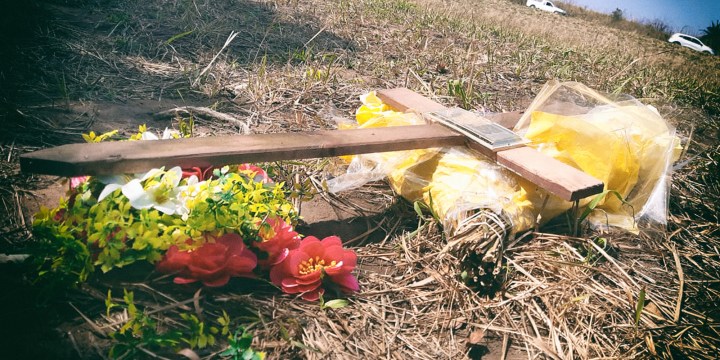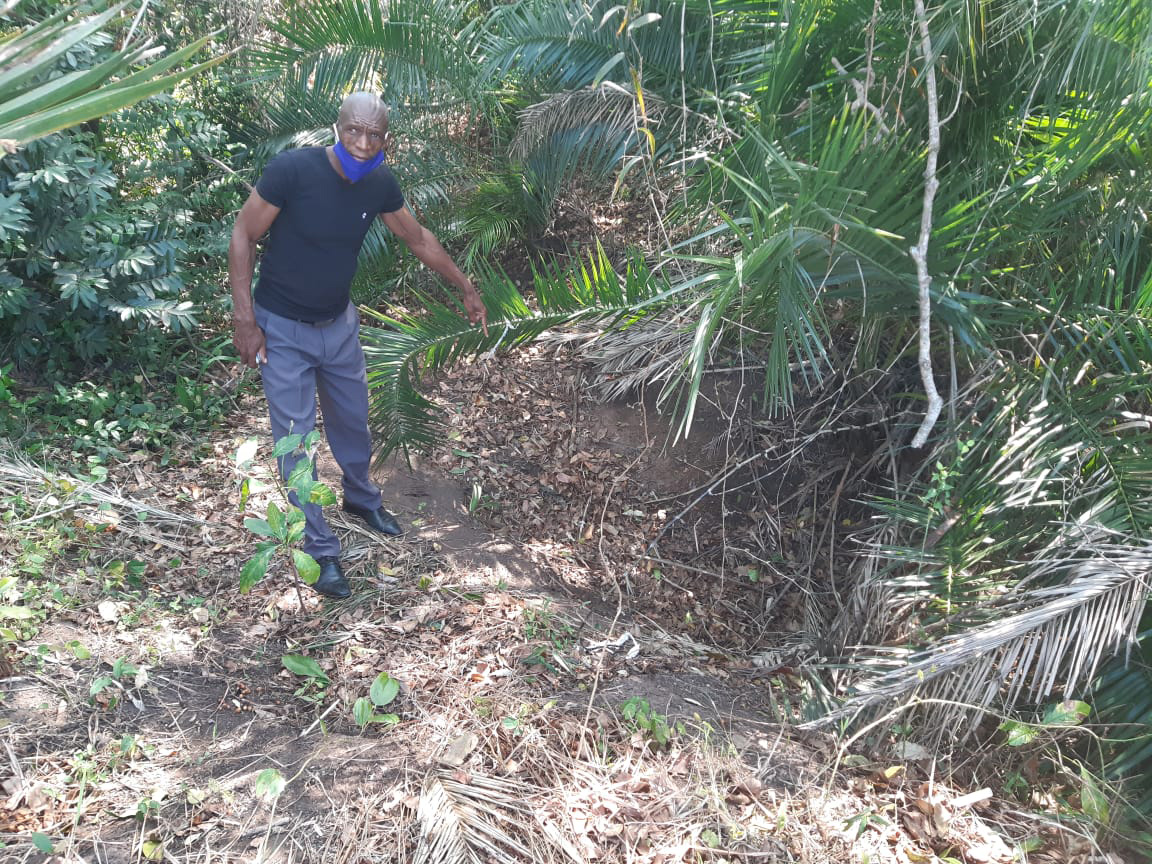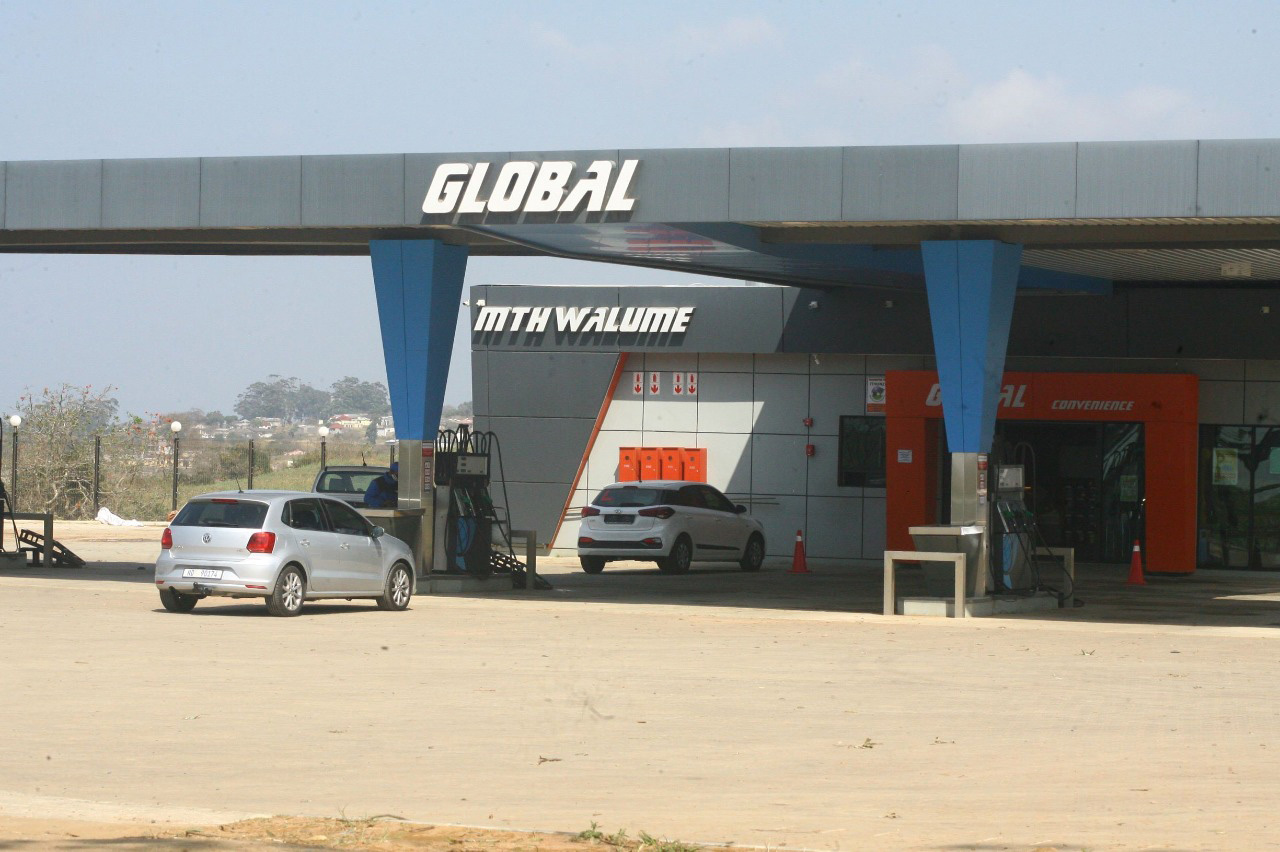KZN MURDERS
Confessed Mtwalume serial killer’s suicide leaves fear and unanswered questions

It remains unclear why a highly specialised, established South African Police Services unit that deals with psychologically motivated crimes was only brought into the Mtwalume serial killing case at the tail end of investigations into the discovery of five female corpses.
While the causes of death varied, there was one glaring coincidence in a series of murders of women in Mtwalume on the south coast of KwaZulu-Natal: the bodies were all discovered within a one-kilometre radius of a single modern business — a newly built petrol station.
It was at this station that the alleged serial killer, the “very quiet” 41-year-old Mduduzi Khomo, worked as a petrol attendant after being “promoted” from his security guard position, which he had held since December.

Councillor Leonard Ngcobo points out one of the dumpsites. (Photo: Desiree Erasmus)
Daily Maverick was told that residents had questioned the efficacy of investigators at Hibberdene police station long before the discovery of the severely decomposed bodies of neighbours and friends (erroneously described as sisters by police) Nosipho, 16, and Akhona Gumede, 25, on April 25 2020.
Such was the state of decomposition that the manner of death was initially unable to be determined for both young women, although police have since told Daily Maverick they had been strangled.

The Global petrol station in Mtwalume where serial killer Mduduzi Khomo worked as a petrol attendant. (Photo: Desiree Erasmus)
According to residents Daily Maverick spoke to when visiting the area, the impatience and frustration at the police’s perceived inability to deal with violent crime was heightened after the murders of the schoolgirl and her unemployed friend.
That frustration changed to near hysteria among women in particular, with the discovery of Neliswa Dube’s partially decomposed corpse on July 6. The unemployed Dube had a stab wound to the chest and two to her neck, according to police, and her body had been dumped in sugarcane fields.
“I walked those fields to get to the taxi rank so I could go drop off my CV. [After Dube’s body was discovered, I thought] that could have been me, even now I think so,” was the typical refrain from the young women Daily Maverick spoke to – university or tech educated, unemployed, living with their families and waiting desperately for job opportunities.
A mobile police station has been erected at a community help centre in Mtwalume, but residents told Daily Maverick it was too little, too late.
For some older residents, the memory of Thozamile Taki is still fresh. Known as the sugarcane killer, the then 40-year-old Taki killed 13 women in Umzinto (about 32km from Mtwalume) and Port St Johns in 2007. He lured his victims with promises of employment.
A father of four who asked not to be named told Daily Maverick that at least in Taki’s case, families had heard testimony and received closure. “This one is very different,” he said. “We will never know why, and that is what we want [to know].”
Fourteen days after Dube’s body was found, the chairman of the local community policing forum, Lucky Bhuyeni, discovered the body of 40-year-old Zama Sylvia Chiliza in the sugarcane field. The unemployed Chiliza was also allegedly strangled.
The following day, another body was discovered. The woman, presumed by police to be in her late 30s, was found in close proximity to where Chiliza had been dumped. She was also allegedly strangled. Her identity is not yet known.
Police have not disclosed if any of the victims were raped, or when the murders were thought to have taken place. They have also dismissed one of the prevailing narratives in the community – that the killings were muthi related — telling Daily Maverick that no organs were removed from any of the victims.
Nevertheless, Leonard Ngcobo, a PR councillor for UGU North, told Daily Maverick:
“The concern is that if the sangoma or inyanga [who allegedly may have paid for the women to be killed] needs more body parts, the killing will continue. That is the greatest fear of the community, which we are all facing.”
SAPS announced on 14 August that two alleged killers had been arrested — Khomo and his colleague, Gcina Njilo, 34, also a petrol attendant at Global filling station.
Khomo hanged himself while in police custody, but made a full confession beforehand, according to police minister Bheki Cele. He was also set to take investigators to additional crime scenes, said Cele, but those plans were thwarted by his suicide.
Khomo did not implicate Njilo in the crimes, Daily Maverick was told, saying instead that Njilo was found in possession of a cellphone and SIM cards belonging to one of the victims because he was poor, and Khomo pitied him. The case against Njilo was dropped for lack of evidence and he was released.
As the Sunday Times reported in August, Njilo is in hiding after receiving death threats. He is still considered by some that Daily Maverick spoke to as being implicated in the killings.
SAPS national spokesman Brigadier Vishnu Naidoo told Daily Maverick that a team from the Investigative Psychology Services (IPS) – a unit specifically established more than 20 years ago to offer expert advice on such crimes — had been working with the investigative team “since the middle of August”.
Naidoo said he could not get hold of the team for a comprehensive answer as to why IPS members were only brought in at that time, but he suspected it was because some of the “inconsistencies in the case didn’t warrant [this] expertise at that early stage”.
There had been more than 160 serial killers in modern South African history, according to Labuschagne, and ones “far more interesting” than the notorious Moses Sithole, who in the mid-90s raped 40 women, killing 37 of them. He is serving a 2,410-year prison sentence for the crimes.
He said that an inquest had been opened for the first murders (Gumede and Gumede) because the causes of death were unknown, and that the other cases surfaced “much later”.
Mtwalume does not register on the “places to visit, things to see” radar of KwaZulu-Natal. Underdeveloped, poor and seemingly irrelevant, it offers very little for travellers compared with other villages, yet the lush open fields, large swathes of cane plantations and crisp, fresh air are a thing of beauty.
But melancholy lingers at the sites where the bodies were discovered. Rotted bunches of flowers, fake pink blossoms and a collapsed wooden cross remain just metres from the site where the bodies of Chiliza and the yet-to-be-identified woman were discovered.
The town is best described as one of the many forgotten, poor cousins of the KwaZulu-Natal South Coast region, with infrastructure and amenities that scream of neglect. While predominantly a rural landscape, the bodies were dumped in some cases just 100m from main thoroughfares. One body was discovered less than a kilometre from a busy taxi rank and market.
South Africa’s Covid-19 lockdown, curfews and subsequently lessened traffic and movement, may have been just the opportunity Khomo was looking for to act out his murderous urges. Many unanswered questions remain. Police told Daily Maverick that Khomo was not being investigated for any other crimes, nor had he ever been convicted of a crime.
He was also a late bloomer, in serial killer terms. Former IPS brigadier Dr Gerard Labuschagne told Daily Maverick:
“Research usually indicates that [serial killers] are about 29 at the time of the first murder, primary school educated, doing manual labour employment, and have a possible criminal history for violent or primary crime.”
There had been more than 160 serial killers in modern South African history, according to Labuschagne, and ones “far more interesting” than the notorious Moses Sithole, who in the mid-90s raped 40 women, killing 37 of them. He is serving a 2,410-year prison sentence for the crimes.
As for the psychological impact on a community in which a serial killer has been operating, Labuschagne said:
“I don’t think anyone has done research on the community impact. Typically, communities experience fear, and if they don’t have faith in the police already, then such cases tend to highlight those cracks and there is a lot of anger.”
South Africans moved on “fairly quickly” after the initial outrage, he said. But if the police were not trusted, or it was thought the suspected killer was still alive (as in Mtwalume community members believing other killers were on the loose and being paid by a sangoma for muthi purposes), “then such cases tend to highlight those cracks and there is a lot of anger”.
“[South Africa] usually has 10 new murder series per year,” Labuschagne told Daily Maverick, and while in KwaZulu-Natal the only active one was the Mtwalume killings, there were “probably” a “few unsolved ones”. DM



















 Become an Insider
Become an Insider
Comments - Please login in order to comment.